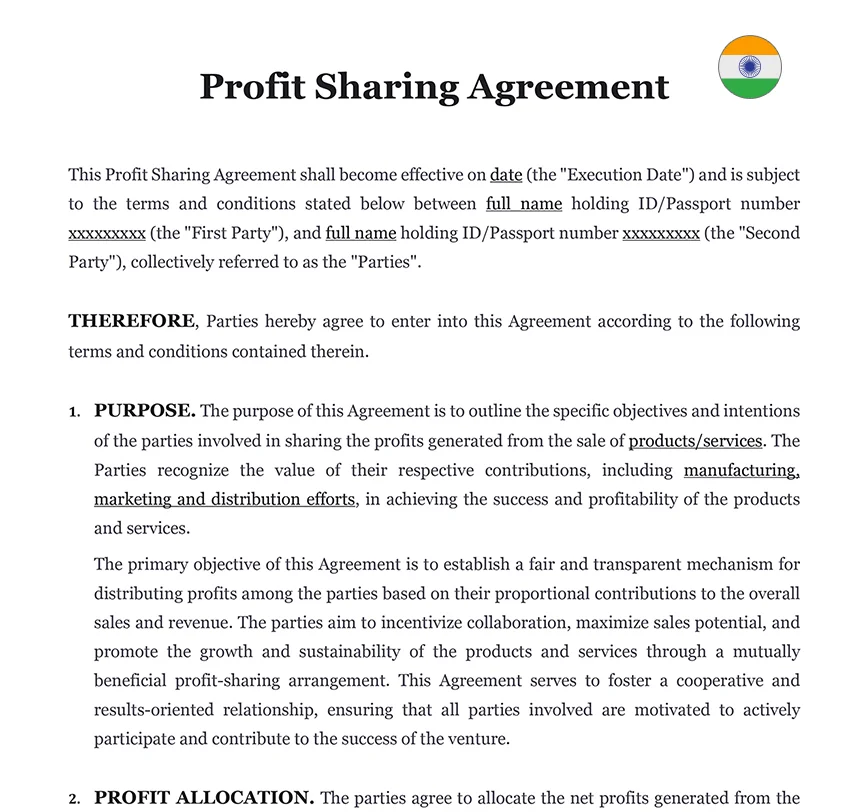Ready to use legal template
Drafted by experienced lawyers
Compliant with Indian law
Ready to use legal template
Drafted by lawyers
Compliant with Indian law
Home › Business contracts › Profit Sharing Agreement
Learn more about Profit Sharing Agreement in India
A Profit Sharing Agreement is a legal contract between parties that outlines the distribution of profits from a business or project. It specifies how the profits will be shared among the participants based on predetermined terms and conditions. This agreement helps establish a fair and transparent framework for profit distribution, ensuring that all involved parties understand their entitlements and obligations in relation to the financial gains generated by the venture.
Table of contents
When is a Profit Sharing Contract used?
A Profit Sharing Contract is used when multiple individuals or entities collaborate on a business or project and agree to share the resulting profits. It is commonly utilized in partnerships, joint ventures, and other business arrangements where the financial gains are expected to be distributed among the participants based on predetermined terms. The contract sets out the rights, responsibilities, and distribution percentages of each party involved, ensuring clarity and fairness in sharing the profits generated by the collective endeavor.
What should Profit Sharing Agreement include?
A Profit Sharing Agreement is a comprehensive document that outlines the terms and conditions related to the distribution of profits between parties involved in a collaborative venture. While the specific details may vary depending on the nature of the agreement and the parties involved, there are several key components commonly found in a Profit Sharing Agreement.
The agreement will clearly identify the parties involved, including their names, addresses, and roles within the venture. It will outline the purpose and objectives of the profit-sharing arrangement, providing a clear understanding of why the agreement is being established.
The Profit Sharing Agreement will specify the method for calculating profits. This may involve outlining the financial information required for profit determination, such as revenue, expenses, and any specific factors to be considered in the calculation process.
The agreement will define the percentage or proportion of profits allocated to each party, based on their contributions or as otherwise agreed upon. It will outline the frequency and timing of profit distributions, ensuring clarity on when and how profits will be shared.
The Profit Sharing Agreement may include provisions related to dispute resolution, confidentiality, non-disclosure, and termination of the agreement. These provisions help address potential conflicts, protect sensitive information, and establish mechanisms for ending the profit-sharing arrangement.
How is profit shared between partners?
Profit sharing between partners typically follows a predetermined method or formula agreed upon in the partnership agreement or profit sharing agreement. The specific approach may vary depending on the nature of the partnership and the terms negotiated by the parties involved. Here are some common methods of profit sharing:
1. Equal Distribution: Partners agree to divide the profits equally among themselves, regardless of the contributions or ownership percentages.
2. Capital-based Distribution: Profits are allocated based on the capital investment made by each partner. Partners with higher capital contributions receive a proportionately higher share of the profits.
3. Ownership-based Distribution: Profit sharing is determined based on the ownership percentages of the partners. Each partner receives a share of the profits corresponding to their ownership stake in the partnership.
4. Performance-based Distribution: Profit sharing is tied to individual or collective performance metrics, such as sales targets, productivity levels, or other predetermined criteria. Partners who meet or exceed the agreed-upon performance benchmarks receive a higher proportion of the profits.
5. Hybrid Approach: Partners may combine multiple factors, such as capital contributions, ownership percentages, and performance metrics, to determine the allocation of profits. This approach allows for a more nuanced and customized distribution based on the specific circumstances of the partnership.
It is crucial to clearly outline the profit-sharing method in the partnership agreement or profit sharing agreement to avoid misunderstandings or conflicts. Each partner’s rights, responsibilities, and entitlements should be clearly defined to ensure transparency and fairness in the profit-sharing process. Seeking legal advice or consulting with a professional can help ensure that the profit-sharing arrangement is structured appropriately and complies with applicable laws and regulations.
How do you calculate profit share percentage?
The calculation of profit share percentage varies depending on the specific circumstances and agreements between parties. One common approach is to determine the ratio of an individual’s or entity’s share of profits to the total profits generated. This can be done by dividing the individual’s or entity’s share of profits by the total profits and multiplying the result by 100 to obtain the percentage. For example, if an individual’s share of profits is $10,000 and the total profits are $100,000, the profit share percentage would be 10% ($10,000 divided by $100,000, multiplied by 100). The exact method of calculation may differ based on the specific terms and conditions outlined in the profit sharing agreement.
How does profit sharing work in India?
In India, profit sharing is a method of distributing a portion of a company’s profits among its employees or partners. The process typically involves setting aside a predetermined percentage of the company’s profits to be shared with eligible participants. The distribution of profits can be based on various factors, such as individual performance, seniority, or a predetermined formula agreed upon by the company and its employees or partners. Profit sharing in India is often governed by legal and regulatory frameworks, and companies may have specific policies and agreements in place to outline the criteria and process for profit sharing. This approach aims to incentivize and reward employees or partners for their contributions to the company’s success, fostering a sense of ownership and motivation among participants.
What to do if one party refuses to sign?
If one party refuses to sign the Profit Sharing Agreement, it can be a challenging situation to navigate. Here are some steps you can take to address this issue :
1. Communication: Start by having an open and honest conversation with the party who is refusing to sign. Understand their concerns and reasons for their reluctance. Try to find common ground and address any misunderstandings.
2. Mediation: If direct communication does not yield a resolution, consider involving a neutral third party, such as a mediator or arbitrator. They can help facilitate discussions and assist in finding a mutually agreeable solution.
3. Review the Agreement: Thoroughly review the agreement together with the party who refuses to sign. Clarify any ambiguous language, address specific concerns, or propose amendments that could alleviate their reservations.
4. Seek Legal Advice: Consult with a lawyer experienced in contract law to understand your rights and options. They can provide guidance on the legal implications of the situation and help explore possible courses of action.
5. Negotiate and Compromise: Engage in negotiations to find a middle ground that satisfies both parties’ interests. Consider alternative solutions or amendments to the agreement that may alleviate concerns and increase the likelihood of reaching a consensus.
6. Document the Attempts: Keep a record of all communication, negotiation attempts, and any proposed changes to the agreement. This documentation can be valuable if the dispute escalates and legal action becomes necessary.
7. Explore Alternative Options: If all attempts to resolve the issue fail, consider exploring alternative options such as finding a different party to participate in the profit-sharing arrangement or reconsidering the viability of the agreement as a whole.
Remember, it’s important to approach the situation with patience, open-mindedness, and a willingness to find a mutually beneficial resolution. Professional advice from a lawyer can be invaluable in guiding you through this process and protecting your rights and interests.
SPECIAL OFFER
Startup
15 Document Package
Essential documents for running your business in India
Profit Sharing AgreementTemplate (.docx)
Save on attorney fees
310 client reviews (4.8/5) ⭐⭐⭐⭐⭐
Share information
Why Themis Partner ?
Make documents forhundreds of purposes
Hundreds of documents
Instant access to our entire library of documents for India.
24/7 legal support
Free legal advice from our network of qualified lawyers.
Easily customized
Editable Word documents, unlimited revisions and copies.
Legal and Reliable
Documents written by lawyers that you can use with confidence.




